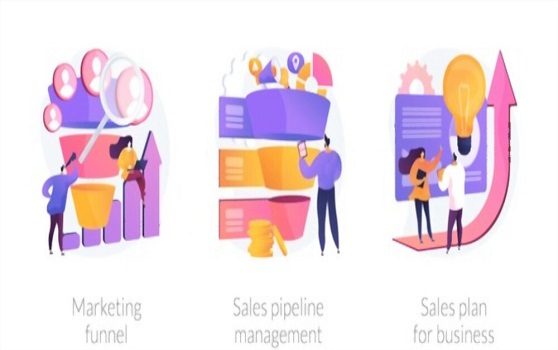What is a sales pipeline? A sales pipeline is a visual portrayal of the sales cycle, This pipeline is likewise regularly used by sales representatives to study the particular strides to move from leads to transactions, and how to compare this with deals. A sales pipeline plays a significant part in any successful business.
The Life Cycle Of Sales Pipeline Management
1. Prospecting and qualification: Before engaging with a possible client, a salesperson should initially recognize if the prospect is important for the objective market. Does the prospect have the need, the fit, or the authority to make a purchase?
2. Interaction: At this stage, the salesperson can start establishing up an affinity with a prospect by assessing what the prospect needs and offering arrangements that may address those requirements.
3. Proposal and Quotation: At this point, a salesperson may send a detailed proposal that convinces the prospect. The proposal can address concerns including financial plan, deadline, expectations, and so forth.
4. Close: Once a proposal has been sent, a prospect may sign the agreement and become a client, or not. For certain businesses, a salesperson keeps on staying in contact with a client, if the aim is to retain them.
Why Sales Pipeline Management Is Important?
Sales Pipeline management gives sales teams a far better idea of the quantity and quality of leads they need to guide through every stage of the sale. Apart from this, Here are some benefits you will reap from managing your pipeline effectively:
1. An organization's salespeople play the role of front lines of the business. They are expected to succeed in your target market and bring new prospective clients as well. Hence, it is essential that you always get ready to monitor the status and accounts of sales representatives.
2. Sales pipeline metrics can paint an accurate picture of what percentage of deals you will close and what percentage of prospects are currently within the pipeline. This makes it simpler to give a gauge on how close the teams are to reaching their quota and permits a business to establish target revenues, foresee future deal droops, and perceive new zones for development.
3. With sales pipeline management, you will effortlessly follow your sales team and see where they are accomplishing and what their trouble points are, Team managers would then be able to help the team members where they are weak, as well as amplify their efforts.
4. Maximizing each sales stage also allows sales managers to work out the proper resources to maneuver a deal closer to the subsequent steps, also as to what proportion of this is often needed.
5. Using information gathered from a sales pipeline, it becomes much easier to nurture prospective customers through the phases of making a deal. Insights on the leads give a salesman more space to make more customized connections that support their necessities, wants, and interests.
Here are the metrics that are crucial in business that your scale pipeline can show:
1. Number of deals that the corporate can close through its delegates
2. Size of deals that the sales representatives can close, if they are big clients or these are the company’s smaller yet regular clients
3. The rate of deals that are successfully becoming profit-earning opportunities for the corporate
4. Amount of your time or the amount it takes to close a successful, profit-earning deal
Conclusion:
With Straight Growth, you can quantify sales productivity and deal with your assets to ensure a smooth progression of tasks. You can even procure modified reports highlighting your prescribed procedures and sort out what fits best with your business objectives.
Let Straight Growth help deal with your sales pipeline while you focus on your business.


